Echocardiography is a type of imaging test that captures images of your heart in motion. Doctors can use these images to diagnose and treat different heart conditions.
The team at UHealth Cardiac and Vascular proudly offers cutting-edge care for your heart and blood vessels. We are pioneers in creating tomorrow’s treatments for today’s patients.
Our expert team includes world-renowned heart and vascular doctor-scientists. We use current and new treatments that contribute to advancing care for our patients. We build our care approach on teamwork to ensure you receive the best care in beautiful South Florida. We talk with you and your health care providers to better understand your needs.
Coming in for an Echocardiogram?
Here's what you need to know before and after your imaging test.
The high-quality services of our Echocardiography Lab reflect our dedication to incorporating top-tier technology and skill in your care.
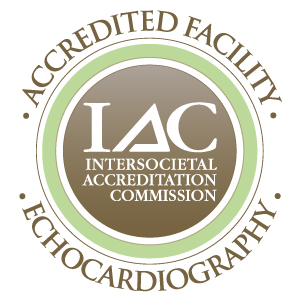
- Our Lab meets the strict standards of the Intersocietal Accreditation Commission (IAC), adhering to published standards and demonstrating our commitment to delivering quality patient care.
- We use the latest imaging technologies such as 3D echocardiography and strain imaging, for an exact and complete review of your heart’s structure and how your heart is working.
- We use advanced methods that are crucial to providing accurate diagnoses and monitoring that form the basis of your treatment plan.
At UHealth, you will receive a forward-thinking approach to your cardiac and vascular health. Our program combines the convenience of getting care locally with the wide-ranging offerings of academic medicine.
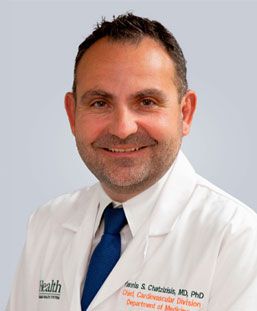
Division of Cardiovascular Medicine
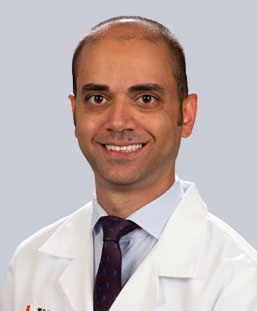
Division of Cardiovascular Medicine
What is an echocardiogram?
An echocardiogram (or echo) requires no radiation. Instead, it uses high-frequency sound waves to generate moving images. These images allow us to see your heart chamber and valves – and how they function.
Other names for an echocardiogram are:
- Heart ultrasound
- Heart sonogram
An echocardiogram is different from an electrocardiogram (or EKG). Here's how:
- An echocardiogram shows pictures of your heart and how it functions.
- An EKG shows your heart’s electrical activity with a series of lines on a graph.
Why would I need an echocardiogram?
An echocardiogram can help diagnose and treat different heart conditions, such as:
- Aortic aneurysms
- Blood clots
- Cardiomyopathy (heart muscle problems)
- Congenital heart disease (present at birth)
- Heart failure
- Heart infection
- Heart rhythm issues
- Heart valve problems
- Peripheral artery disease
Your doctor may also recommend an echocardiogram to see how heart treatments are working or assess possible heart disease symptoms such as:
- Abnormal blood pressure
- Heart murmur
- Irregular heartbeat
- Shortness of breath
- Swollen legs
What are the echocardiogram methods?
We use different echo imaging methods, depending on your needs. These may include:
- Two-dimensional (2-D) echocardiography. This is the most common approach. It shows a cross-sectional “slice” of your heart, including your heart walls, valves, and blood vessels.
- Three-dimensional (3-D) echocardiography. This approach offers more views than standard 2-D imaging and may help assess certain conditions more accurately.
- Doppler ultrasound. This tells us about the speed and direction of your blood flow.
- Color Doppler ultrasound. This Doppler test uses color to show the direction of your blood flow.
- Strain imaging. This can provide better views of heart muscle movement. It can help support earlier detection of certain conditions like heart failure.
- Interventional or structural echocardiography. This uses echo imaging to help guide cardiac procedures – such as valve replacements – for more precise care.
What are the risks of an echocardiogram?
Echocardiograms require no radiation, and the sound waves they use are harmless. Still, they can have some potential side effects and risks.
Our team will talk with you about this before your procedure. For example:
- If you have contrast dye, there is a small risk of an allergic reaction. Severe allergic reactions are very rare.
- Although rare, medicine given during a stress echo may result in serious complications such as a heart attack.
- If you have a transesophageal echocardiogram, you may experience issues such as a temporary sore throat following your procedure. Also, other potentially more serious complications can happen. Before a transesophageal echocardiogram, your doctor will explain the process and its risks and benefits. You’ll need to sign a consent form. This is an ideal time to ask any questions.
The mission of the Echocardiography Laboratory at the University of Miami Health System is to excel in providing state-of-the-art echocardiographic diagnostics, infused with a deep commitment to exceptional patient care. As an academic medical center, we aim to enhance patient outcomes through advanced technology, foster innovation, and educate future leaders in a collaborative, multidisciplinary environment.
Meet the Team
-
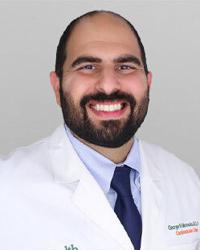
George R Marzouka, MD
Cardiology -
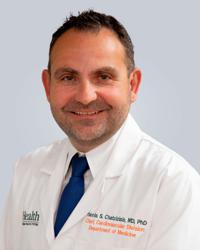
Ioannis S Chatzizisis, MD, PhD
Structural Heart Disease Cardiology, Cardiac Imaging, Interventional Cardiology -
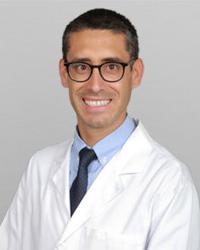
Andrew Daniel Bromley, MD
Preventive Cardiology, Structural Heart Disease Cardiology, Cardiology -
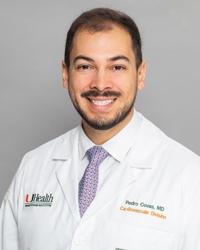
Pedro Covas, MD
Structural Heart Disease Cardiology, Cardiac Imaging, Cardiology -
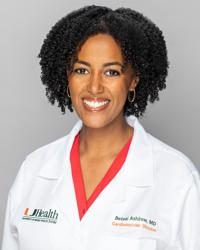
Beteal Ashinne, MD
Cardiology -
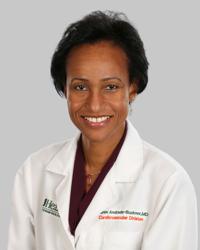
Sharon N Andrade-Bucknor, MD
Cardiology -
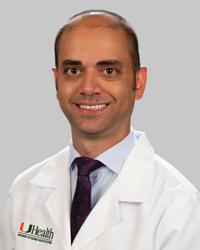
Mehrdad Ghahramani, MD, FACC
Structural Heart Disease Cardiology, Cardiology, Cardiac Imaging -
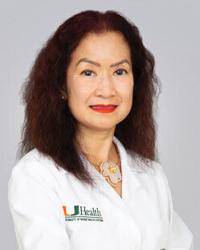
Thanh H Duong-Wagner, MD
Cardiology
Our Locations
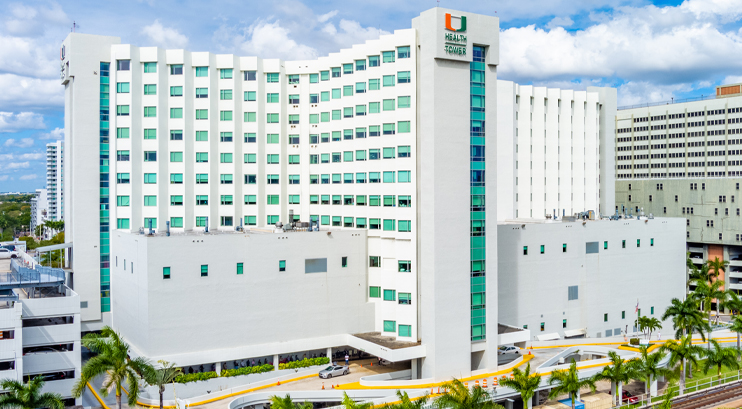
UHealth Tower
1400 NW 12th AvenueSuite 500
Miami, FL 33136

Sylvester Comprehensive Cancer Center
1475 NW 12th Avenue
Ground Floor, Room c905
Miami, FL 33136
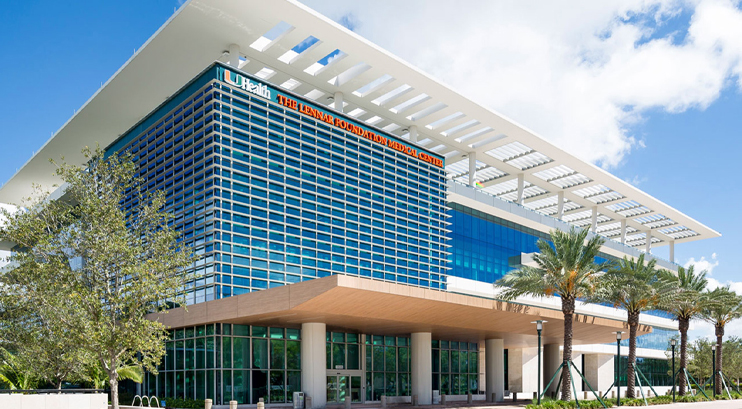
Lennar Foundation Medical Center
5555 Ponce De Leon Boulevard
3rd floor
Coral Gables, FL 33146
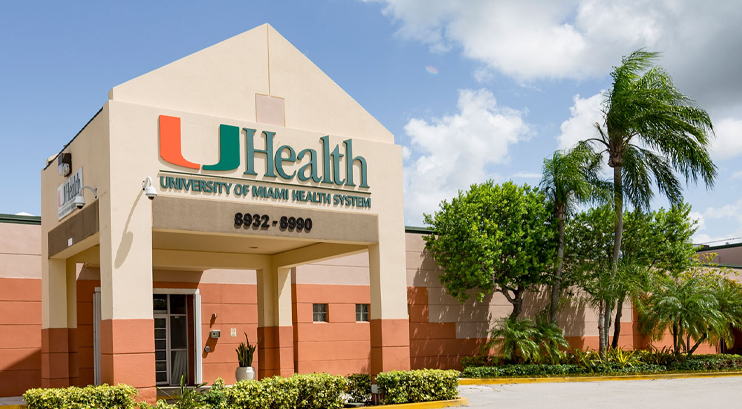
UHealth at Kendall
8932 SW 97th Avenue
Miami, FL 33176

UHealth at Plantation
8100 SW 10th Street
Suite 2500
Plantation, FL 33324

UHealth at Downtown West Palm Beach
185 Banyan Boulevard
2nd Floor
West Palm Beach, FL 33401
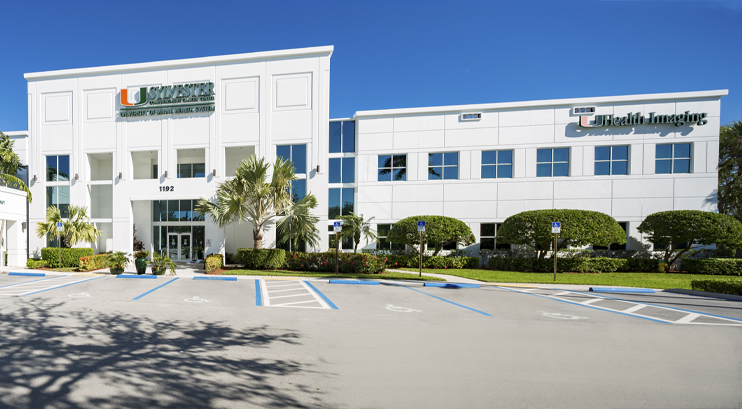
UHealth at Deerfield Beach
1192 E Newport Center Drive
1st floor, STE 100
Deerfield Beach, FL 33442
Why Choose UHealth?
Better, more precise, more accurate diagnosis and care. Getting an accurate diagnosis is key to achieving the best possible cardiac outcomes. Our echocardiography team provides expert services and care to help you receive timely, effective, personalized treatment. Plus, we offer other advanced cardiac imaging techniques, if needed, to ensure you receive the care that’s right for you.
An advanced, accredited laboratory. Our echocardiography laboratory is accredited by the Intersocietal Accreditation Commission (IAC), demonstrating our commitment to quality care. We go above and beyond standard testing procedures to provide advanced imaging technologies and techniques like 3D echocardiography and strain imaging.
Accessible, cutting-edge imaging services. We offer multiple imaging locations around South Florida to help make it convenient for you to get access to advanced echocardiography services. You can count on the same high level of expertise no matter which facility you choose.
A forward-thinking, collaborative care approach. Our team consists of world-renowned heart and vascular physician-scientists recognized for their innovative and life-saving treatment methodologies. As part of an academic institution, we’re continually advancing the field of cardiovascular medicine and bringing innovative care to you.
Artificial-intelligence-powered imaging. As an academic medical center, we’re pioneering new ways to use artificial intelligence (AI) to help us achieve faster, better diagnoses. We’re also using AI to plan for complex procedures and train care providers on the latest techniques for cardiac care. This promises to support better outcomes and peace of mind for patients in the treatment of heart disease.
New cardiac technology center in South Florida. To further research and development into new innovations, we recently opened the Center for Digital Cardiovascular Innovations at our Miller School of Medicine. This unites researchers and others to discover the next technologies in heart medicine and bring them here for you.
Questions? We're here to help.
Our appointment specialists are ready to help you find what you need. Contact us today.